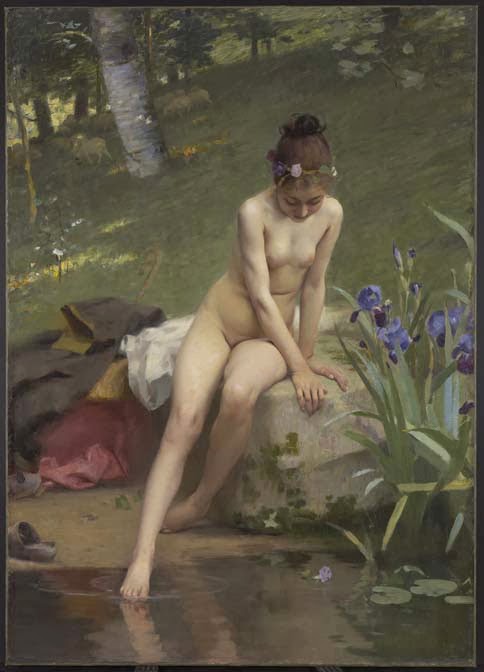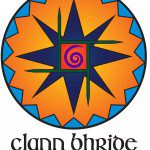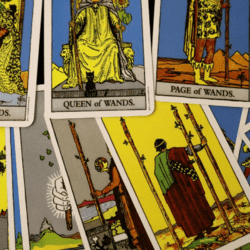 Happy Imbolc! I said in my last column that I was going to write about memorization and how to improve it this week, but it seemed appropriate, since it’s just after Imbolc, to discuss a different topic. Traditionally for many Witches, Imbolc is a time when tools are re-consecrated, and when initiations take place. I think there is a great value to initiation and personal transformation in the process of learning the Craft and I thought I might write about that.
Happy Imbolc! I said in my last column that I was going to write about memorization and how to improve it this week, but it seemed appropriate, since it’s just after Imbolc, to discuss a different topic. Traditionally for many Witches, Imbolc is a time when tools are re-consecrated, and when initiations take place. I think there is a great value to initiation and personal transformation in the process of learning the Craft and I thought I might write about that.
Note that I am not talking about lineage! Some traditions say that “only a Witch can make a Witch,” but the gods can also make Witches. There are some experiences that, simply by going through them, change us forever. The transformation is instant and sudden, but a full grasp of its effects may elude us for some time. I’m going to write about those experiences, how they change us, and why this is so important in the study of the Craft.
A Definition
An initiation is described at Dictionary.com as: “formal admission into an organization or club, adult status in one’s community or society, etc.,” “the often secret ceremony initiating new members into an organization,” and the relevant ceremonies that confer this status. It is sometimes used as a synonym for a rite of passage, which is “a ceremony performed to facilitate or mark a person’s change of status upon any of several highly important occasions, as at the onset of puberty or upon entry into marriage or into a clan,” or “any important act or event that serves to mark a passage from one stage of life to another.”
Of course most of us are aware that even if we are not involved in a tradition that practices it, the Wiccans (and most Pagan and Ritual Magick groups like the O.T.O, the Golden Dawn, the Cambridge Druids, etc.) required an initiation ceremony in order to be considered part of the group and taught its rituals and secrets. Of course, that’s what First Degree used to mean. Stewart Farrar describes in his classic book What Witches Do how he was a journalist intending to do a story on Alex Sanders and his coven, and they wouldn’t let him do it until he initiated. But he didn’t require any previous training to initiate, either. It was what you did before you got the training. In this sense, they implied the first meaning of initiation; it was how you joined the group.
It’s my perception that most traditions that practice initiation now view it more in the sense of a rite of passage. We don’t usually confer it until you have been practicing (or even practicing specifically within the tradition) for at least a year and a day. The view is, in general, that it marks a change in status. It’s seen almost like the first step in a process of taking Holy Orders. It is thought to mark a new level of commitment to the Craft.
Rituals of initiation are designed to affect a change of consciousness. Most of them are some variation on a symbolic rebirth, and in fact, many traditions refer to an initiate as one of the “twice-born.” The ceremony is intended to be a life-changing experience just as puberty rites or weddings are life-changing experiences. The ritual both confirms and acknowledges that transformation.
In these ways, initiation ceremonies are not much different from baptisms, except that they are not conferred upon infants or small children and they are always a conscious choice entered in “of our own free will.” But baptisms can be powerful, transformative experiences as well. My friend Tanya, whose family was of a more liberal Baptist branch, chose to be baptized when we were both about fourteen. I was not raised in a Christian household and it was the first baptism I had seen. It was a statement of her faith and her commitment. She cried and so did I.
In that respect, I believe the same purpose can be accomplished in a personal Dedication ceremony. If you have no desire to join a tradition, many books on solitary Wicca, and many more sources online, offer rituals to Dedicate yourself to the Craft, declare yourself a Witch, and make an oath to follow the Craft. I only have one caveat about that, which is that rites of passage always involve oaths made before witnesses. That’s part of the point; you offer an Oath, and the people who saw it hold you to it (and yes, so do the gods of course, but the community will as well.) So if you don’t have any local Witches or Pagans to practice with, perhaps invite a friend you can trust so that someone will hear your pledge at any rate.
Second Degree initiation rituals usually involve a symbolic death. The idea is to surrender one life and take on another. This has much in common with baptism as well, but it also has much in common with rites of passage in shamanic traditions. You stop being what you were, and you become something else. The lessons of these experiences are always traumatic; be in pain, death, fear, suffering or sacrifice.
I believe (and this is entirely a personal belief based on observation of a loose and informal nature over many years) that whenever a Witch reaches a certain point in her or his Craft, she or he will have a need to teach others in order to continue her or his own path of learning. At that point, if an initiation ritual is not performed, life will provide an initiatory experience that will teach the lessons inherent in a “symbolic death” anyway. As I have written about before, the purpose of this is to break the ego and deflate the head. A teacher has a position of authority, and it is important to develop empathy for the suffering of others, and also, to have a proper relationship with power so that you don’t come across as wishy-washy, or lord-and-lady it over others. Exercises in working with the Iron Pentacle are helpful in avoiding this; T. Thorn Coyle has an excellent exercise in her book Evolutionary Witchcraft, and I based an exercise on hers with some of my own interpretations in my upcoming book (and blog).
I don’t think this can be avoided; but neither do I think that initiation at the hands of another Witch is required (though you don’t get the benefits of the lineage – and that’s access to the egregor of the tradition and their Old Ones, not any sort of status concept, that I am referring to – without it.) This is the transformation of the butterfly. I am sure that the caterpillar feels as though it is dying. And in effect, it is, because it will never be a caterpillar again.
Certainly many, perhaps most of us, will never have the desire to initiate to even the First Degree, and many less will be propelled into Second Degree. There’s not a thing wrong with that. I believe that initiation is a path of mysticism within the religion(s) of Wicca or Witchcraft. I don’t think initiation is necessary to be a Wiccan; but I do believe it is necessary to be a (Wiccan) Witch.[1]
Even fewer of us will ever see the need to take our Third Degree. And that’s only to be expected. In many ways, this ceremony is about taking Holy Orders. There’s no going back; you become our path’s equivalent of a nun or a traditional shaman. You dedicate your life to serving and teaching the Craft, even if you have other jobs to pay the bills. And not everyone wants to make that commitment. Why should they? Not every Christian becomes a priest either.
In many religious traditions, this is a symbolic marriage. Nuns are the Brides of Christ, for example. And of course, we Wiccans have our Hieros Gamos; only depending on tradition, this is often not at all symbolic.
I do believe this one can happen spontaneously also, but that it takes another person for it to do so. In other words, most of us find our way here by means of a formal initiation and Great Rite; but others have found themselves called to Great Rites either by accident, or in a situation in which the other person was Manifesting and sometimes even unaware of it. This is formal union with the Divine. I also think this is the (incredibly rare) exception,[2] and those who claim to have been initiated to the Third Degree by the Goddess on a mountaintop should probably be regarded with suspicion and incredulity until they prove they know what they’re talking about and can walk their talk (though I suppose that holds true for everyone.) This, too, is every bit as much a transformation as a marriage. It means you will be tied to the gods (especially those you dedicated to) for the rest of your life, and must always consider how your actions affect Them and Their actions affect you; even if that is to separate eventually and meet periodically to discuss the fate of the children.
Above all, these experiences inevitably change you, just as any other rite of passage.
Without threatening any Oaths you may have taken, I invite you to share your initiation and transformation stories (formal or informal) in the comments section.
Next column: Johnny’s Mnemonics: Tricks and Tools to Aid Memorization
[1] Yes, I happily and readily accept that some Pagans do call themselves Witches and they are not Wiccans. That’s fair enough; I have no issues with that. But I can only speak to my own tradition and experience, and in the practice of Wicca or similar paths, the word “witch” has a particular meaning. I believe initiation, either person or in coven, is the path to it.
[2] Another exception might be found in Dianic Craft, in which “Third Degree” is the result of the natural initiation into Cronehood; which has its own Mysteries and wisdom to grant. This, however, is a different set of Mysteries.
Seekers and Guides is published on alternate Mondays. Follow it via RSS or e-mail!

















